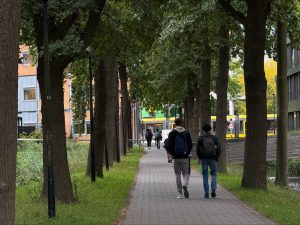International students in the Netherlands are more likely to face mental health issues than Dutch students. Their well-being is affected by housing difficulties, financial concerns, cultural adjustment and loneliness. Teacher and author Raimke Groothuizen encourages students to build communities around their interests and seek friends they can talk openly about mental health.
The Netherlands is a popular destination for studying abroad. However, international students are more prone to experiencing anxiety, depression and loneliness than Dutch students. That’s according to a report by Nuffic, the Dutch organisation for internationalisation in education.
One of the biggest struggles for all students in the Netherlands concerns housing. While it affects both local and international students, Dutch students often have a larger social network and option of living with their family. The lack of such safety net can lead to stress and feelings of isolation among international students.

Photo: Jennie Mariani-Cerati
Teacher Raimke Groothuizen wants to remind people that Dutch students also go through various challenges, and that international and local students may share similar experiences more often than they might realize. Groothuizen has years of experience in education and she has, among other things, written a book about student well-being and performance pressure.
”Every student, whether or not they’re international, has their own story. In my experience a lot of students feel quite lonely, especially international students. It is also more difficult for them to access support services”, she says.
Groothuizen teaches mostly Dutch students at Avans University of Applied Sciences, and she has noticed that they don’t spend much time with international students.
”Especially after Covid it seemed that international students had more difficulty to get to know the local students and find their place in the city. Housing is a big problem, but also where to start making new friends”, she points out.
Forming local friendships can make cultural adaptation much easier for international students. Beyond individul well-being, Nuffic also reports that intercultural learning prepares all students for global careers and develops skills such as collaboration, critical thinking and openness.
So it is important that local and international students meet, connect and build communities around common interests. But how to get started? Groothuizen advises students to look up available programs in their university. She offers an example from Breda, where the Good Mood program helps students to get to know the city, explore new hobbies and connect with one another. She also wishes that teachers would find out about these programs and encourage their students to participate.
”I think what’s really important also as a teacher and a professor, is to give the good example and try to get students more curious about each other.”

Photo: Jennie Mariani-Cerati




